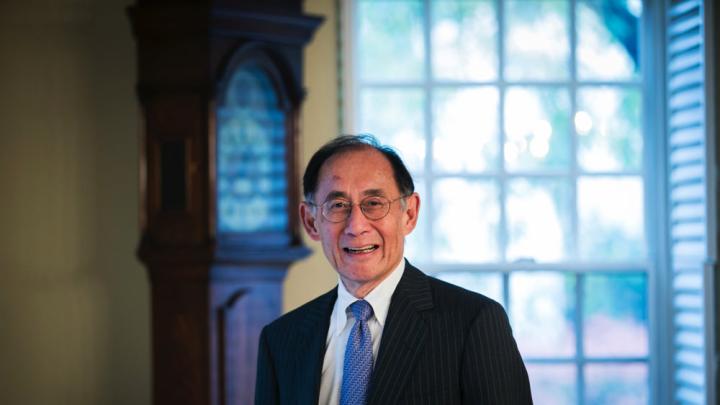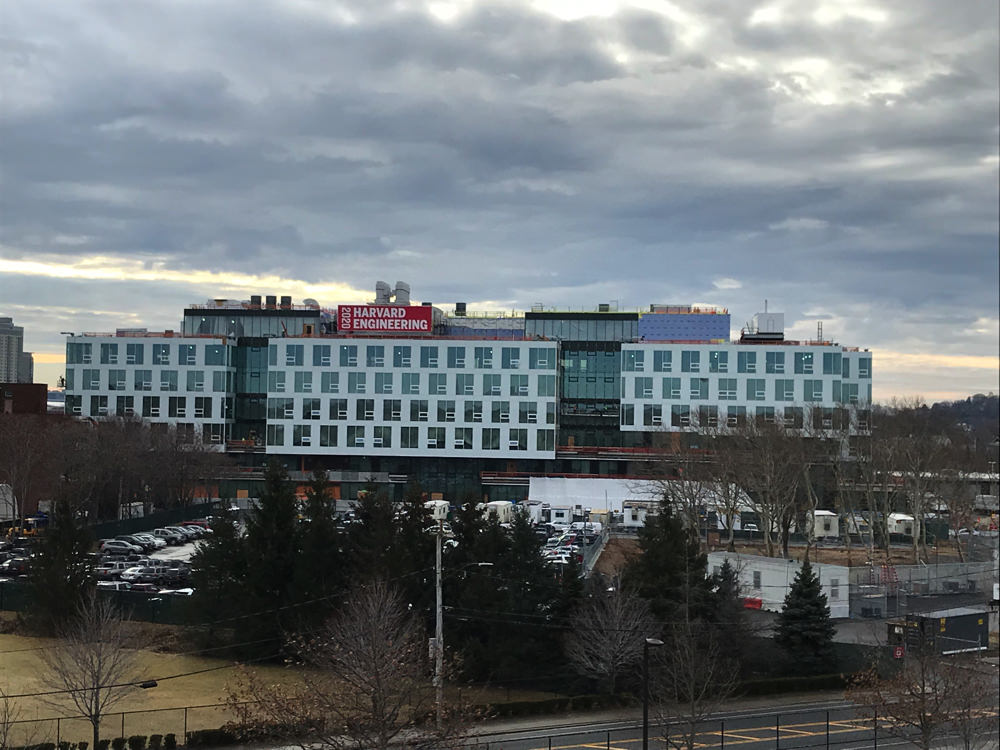Assessing the academic year now drawing to a close, William F. Lee, senior fellow of the Harvard Corporation, said today in one of his periodic briefings on the governing boards’ work, “One of the most critical things this year was the first year of our new president,” Lawrence S. Bacow. Given the twenty-ninth president’s experience in higher education (at MIT and Tufts), his knowledge of the Greater Boston academic community, and his immersion in the University (as a fellow of the Corporation himself, beginning in 2011), Lee said, the governing boards expected him to “hit the ground running,” and wanted to be in position to ensure that he was able to do so. Nearly 11 months after Bacow officially assumed the presidency, Lee continued, Harvard has made “great progress” on five strategic imperatives that matter significantly to the institution.
• The Allston campus. Lee listed first “more aggressively pursuing the development of Allston,” both academically and “more broadly.”
The leading academic initiative is constructing the science and engineering center on Western Avenue, across from the Harvard Business School (HBS) campus. Much of the engineering and applied sciences faculty, and associated research and teaching facilities, are expected to be in place by late summer 2020, in time for the beginning of that academic year, and indeed the building now bears a bold “Harvard Engineering/2020” banner.
The recently announced gift to relocate the American Repertory Theater (ART) from Cambridge to Allston, likely on North Harvard Street, is a significant addition to the roster of specific projects now planned there (and augments the arts beachhead established by the new ArtLab). The combination of the engineering and applied sciences facility with the ART, HBS, and the iLab (entrepreneurship facilities) “provide huge energy to the development of Allston,” Lee said. So will the Allston Land Company, organized late last year to focus on commercial development that is envisioned for Harvard’s “enterprise research campus” east of the engineering complex, also along Western Avenue.
• Collaboration, within and beyond Harvard. Next, Lee cited opportunities for collaboration and cooperative ventures not only within this very decentralized University (he cited Bacow’s term for this work, “One University 2.0”—a nod to predecessor Drew Gilpin Faust’s theme), but extending to the affiliated academic medical centers and other local institutions of higher education, such as MIT.
He pointed to the Harvard Quantum Initiative, unveiled late last year, which aims not only to bring together the University’s basic scientists, but also to build ties to MIT engineering expertise in the field (at its Cambridge campus and its Lincoln Labs affiliate in the suburbs)—and to connect as well to local commercial enterprises active in the field. Lee said Harvard and MIT are also discussing cooperative ventures in artificial intelligence (a field in which the latter envisions a $1-billion new, dedicated “college”).
Similarly, Harvard, MIT, other universities, the affiliated hospitals, and the Commonwealth of Massachusetts are pursuing life-sciences collaborations, focused on digital healthcare; ways of handling the torrents of data produced from biomedical research and care; and an initial shared research facility. The latter, Lee said, is nearing inception and will have dual benefits: immediate applications for life scientists, entrepreneurs, and faculty members and their students; and longer term, as a model venture that “brought together the academic community, the governor, the attorney general, and the business community to do something for our collective wellbeing” in life-sciences research and development. It success will provide momentum for future, successor collaborative ventures important to Greater Boston’s role as a leading life-sciences ecosystem—a strategic imperative Lee has emphasized continuously.
• Advocating for higher education and the liberal arts. In selecting Bacow as president, the search committee and governing boards thought he would play a significant role as a national “spokesman for the importance of higher education and a liberal-arts education,” Lee said, echoing a theme he emphasized when the appointment was announced in February 2018. Accordingly, he noted, the president has during this past year conducted “lots of his work on the road and in Washington,” delivering the message that education is a key for social and economic success. That work has involved both addressing the issues in speeches and conferring with political leaders, as well as reaching out to other parts of the country (like Bacow’s September visit to Michigan): making personal appearances and creating concrete programs like Harvard’s joint research ventures with the University of Michigan. (An early result of that collaboration was the research conference on opioids held earlier this month.) On both fronts, Lee said, there had been good progress.
The external environment “is the most difficult climate I’ve encountered” during 15 years of service on the governing boards, Lee said, given diverse criticisms of elite institutions, and pervasive distrust of institutions generally, particularly among younger people. Harvard, he noted, is of course the ultimate elite institution, and so is naturally challenged under current circumstances. But “Larry [Bacow] is in a very good position to help us address these issues,” as an articulate spokesman for higher education generally, and a seasoned educational leader genuinely interested in reaching out to communities (like those in Michigan, where he grew up) that feel elite institutions have done little, if anything, to benefit them directly.
More broadly, Lee said, the University’s core work of educating a “really diverse student body—ethnically, racially, economically, geographically—who can bring the benefits of education back to their communities” was an essential response to prevailing critiques.
By virtue of Bacow’s experience, inclinations, and access to advisers like Corporation members Shirley M. Tilghman and Biddy Martin (respectively, the past and current presidents of Princeton and Amherst), Lee added, Harvard’s leader “puts us in a position to be able to attack the problem” and devise concrete solutions. At the least, he hoped, such efforts would restore the pendulum of opinion, now at a point of extreme antipathy to institutions and elite universities, to a more neutral position.
• The endowment. As ever, Lee noted, the Corporation must “ensure the responsible stewardship of the endowment.” He pointed to progress under the leadership of N.P. Narvekar, but cautioned that a turnaround, pursuing Harvard Management Company’s new strategies and operating style, is a five- to 10-year project, the results of which cannot be fully assessed sooner. (Narvekar was brought in to correct persistent underperformance.) [Updated May 24, 2019, 10:30 a.m., adding this new sentence: Also in a financial vein, Lee indicated that come this fall, “When we finally report [fiscal-year results], it was a great fundraising year to boot.”]
• Upholding core values. Finally, Lee said, the Corporation and University leadership are focused on the “critically important collection of values called diversity and inclusion and [their] intersection with free speech and free thought.” The interplay of these values, he noted manifests itself “in many different ways, some of them not ideal”—a nod to the April occasion when student divestment protestors prevented Bacow and Graduate School of Education Bridget Terry Long from conducting a planned discussion before an audience at the Harvard Kennedy School earlier this semester.
Lee said that he meets twice yearly with the governing-board chairs of the Ivy League schools, MIT, Stanford, and the University of Chicago. This constellation of issues has risen sharply in salience for all the institutions during the past two years, he said: how their institutions can accommodate protests while protecting speech; how communities that have become unimaginably more diverse since his own student days (Lee is A.B. ’72) can be truly inclusive of all perspectives. The challenges, he said, are “huge.”
On other matters, Lee declined to address concerns about the litigation challenging Harvard’s undergraduate admissions policies. As the University’s counsel in the case (he is a litigator), Lee has recused himself from Corporation deliberations or external comment on admissions issues.
Lee also offered some context for the somewhat surprising announcement earlier in the day that James W. Breyer, M.B.A. ’87, would step down from the Corporation at the conclusion of his six-year term, effective at the end of this academic year. He noted that the governance reforms enacted in late 2010 did point toward typical service, subject to reviews of performance, of two six-year terms. Some of the fellows appointed in the wake of the reforms, when the Corporation’s membership expanded from six members to a dozen (plus the president), agreed to serve just one term, he said, in order to make way for a younger cohort of fellows; that apparently explains the decision by Joseph J. O’Donnell ’67, M.B.A. ’71, and Jessica Tuchman Mathews ’67 to step down. Breyer is indeed from a younger generation, Lee noted, but during his fifth-year review last year, he signaled that his business commitments in Asia and the travel demands from the West Coast across the Pacific and to Cambridge inclined him to limit his Corporation service to one term.
As for Lee’s own plans, he said that his service as a fellow, begun with the 2010 reforms, had been evaluated in an exhaustive review conducted by then-Corporation member Nannerl Keohane (president emerita of Duke), resulting in a presumption of continued service, subject to suitable performance, through 2022. Having become senior fellow in 2014, he expects to remain in that capacity through the end of his service, Lee said.
In light of his perspective on where the University is proceeding, he might well be expected to enjoy the service. A large, diverse community like Harvard, he said, generates all sorts of news and controversies daily. But when one steps back and looks at where the University is headed during the next quarter- or half-century, as it strives to remain a preeminent higher-education institution, he concluded, “It’s been a year of good progress.”









